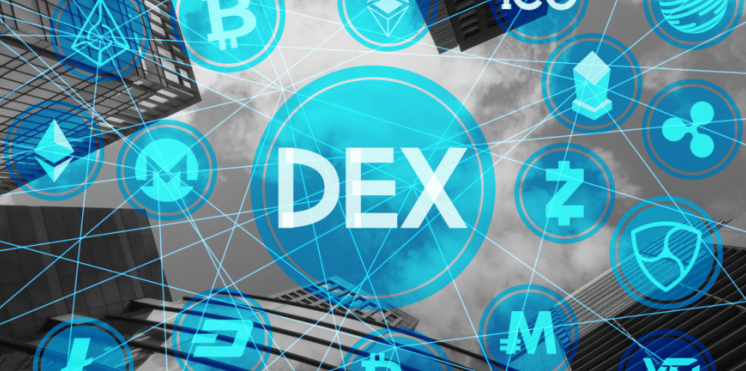Decentralized exchanges: Why do markets need them? (Part 1)
Non-coin people may think that the concept of “decentralized exchanges” is contradictory: How can a centralized asset trading entity be decentralized? But in the world of cryptocurrencies, everything is possible. The meaning of “decentralization” is actually narrow: the use of distributed network structures in a mode that eliminates the impact of individuals or organizations. Obviously, in this era of openness and advocacy of democracy and privacy, decentralization is more in line with the demands of people in the current society to protect their own interests.

So who is dissatisfied with the central exchange?
The existence of a centralized exchange is a reason for the blockchain value supporters to sneak. Despite this, the reality forces many to compromise on beliefs: the cryptocurrency market requires liquidity, user support, and simple services, and centralized exchanges can fully achieve these goals. But compromise does not mean that the problem can fade.
“How to make the exchange decentralized? Is it still an exchange in the future?” “What characteristics do exchanges need to sacrifice in order to achieve openness, independence, and decentralized control? Perhaps, for convenience and acceptance, we must sacrifice some Decentralization?"
- Joint cofferdam "Ao Ben Cong"! Without the exchange, is the BSV completely cold?
- There is not much time left for the cryptocurrency.
- Discussion: The currency is down the BSV, is this right?
The arguments of these blockchain value supporters have always been idealized and difficult to implement at the theoretical level. However, the multi-million dollar fund leaks that have occurred in many existing crypto transactions have caused a wave of anger, forcing many developers and entrepreneurs to find alternatives.
Centralized exchange defect
Centralized exchange users interact with organizational services and are completely controlled by their owners, who can manage their functions, suspend and restart various tools, and change quotes during the transaction.
There are many speculations about exchange bias management, suspicious operations on certain cryptocurrencies, and employee alleged involvement in fraud schemes. Unfortunately, these speculations are not groundless, and we can't guarantee that some excessive behavior will not happen again in the future. Centralized exchanges act as operators of personal data, store information about transactions and private keys, and access customer accounts—the risk of fraud is always there.
In addition, the operating principles of centralized exchanges allow for the storage of participants' funds. Therefore, deposit services are an attractive target for hackers. Hackers can gain access to large amounts of funds through attacks, which is economical and will occur sooner or later. .
How do decentralized exchanges address these shortcomings?
Decentralization is the solution provided by the blockchain. Using distributed ledgers is not a panacea, depending on how it is used, but it is an opportunity to interact with users using blockchains and smart contracts, and without storing their private keys and other data.
If a hacker attacks one of the participants, the distributed data store will not compromise the entire exchange. The absence of a central agency (organization, group, or person managing the exchange) makes the transaction process unaffected by unfair operations. When the exchange's client does not transfer his or her funds to the exchange's wallet but directly sends the funds – there is no possibility to obtain funds by attacking the exchange.
Is the decentralized exchange perfect?
There is no perfect thing. The advantages and disadvantages of decentralization coexist. As with the operation of the blockchain, it takes time to record the transaction in the block and confirm it through the network.
The problem of capacity expansion is not uncommon. The influx of large numbers of people in cryptocurrency transactions will inevitably load the network, causing delays, increased commission fees and other problems.
In addition, the immutability of one of the basic principles of blockchain has made it impossible to cancel a submitted transaction: refunds are not compatible with distributed ledgers, and users who submit incorrect operations or lose key control will not be able to recover lost funds, mass consumers Whether it is ready to take on this responsibility is still a major issue. The technical complexity of blockchain operations faced by novices is another reason why it is difficult to take advantage of decentralized exchanges.
KYC and AML are also controversial. Large-scale and high-quality blockchain projects are pouring into the arms of regulators and unconditionally accepting their rules of the game. In order to gain legal status and thus open the door to a large number of fund holders, the exchange introduced an authentication procedure and a detailed report type, but this model runs counter to the decentralization principle. It can be seen that the implementation of decentralized exchanges will face more difficulties.
Small decentralization
The solution may be "semi-decentralized" – if the word is consistent with common sense. In order to provide customers with familiar services and improve security, the functional part of the exchange is transferred to the blockchain: smart contracts are the main tools for trading; decentralized applications and protocol management exchanges – but the former is centralized by the central server management.
We have considered the basic principles, strengths and weaknesses of decentralized exchanges, and the next article will discuss projects that are consistent with the principles of decentralization.
Author: First Class Source: micro-channel public number of first class For reprint, please indicate the source.
We will continue to update Blocking; if you have any questions or suggestions, please contact us!
Was this article helpful?
93 out of 132 found this helpful
Related articles
- Yu Jianing: Blockchains 1.0, 2.0, and 3.0 have produced three kinds of certificates. What are their intrinsic values?
- How does Newton, the second phase of the Firecoin Prime project, break the traditional e-commerce?
- Currency Ann Shapeshift off BSV, the two sides support the camp conflict continues to intensify
- With the power of one's own mouth, the whole coin circle, what does Ao Ben Cong want?
- Babbitt Column | Analysis of the Open Source Economy of Blockchain
- Escape 996! How blockchain and cryptocurrencies make freelancers more "free"
- The currency will be off the BSV, BCH skyrocketing, read the whole process!






